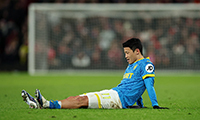Mulheren was a stock trader who had been arrested three years earlier, at the behest of Rudolph Giuliani, then the U.S. attorney for the Southern District of New York. Although Mulheren’s actual indictment didn’t take place until a few months after Giuliani left office, the case was still considered part of his legacy. As U.S. attorney, Giuliani had gone hard at Wall Street, forcing a guilty plea from Michael Milken, the most important financier of his day, and getting Ivan Boesky, a well-known arbitrageur, to turn state’s evidence. According to The Los Angeles Times, by 1988, Giuliani had brought five times as many insider-trading cases as had ever been brought before in his district.
The Mulheren case spoke to another part of Giuliani’s legacy, however. There were examples of Giuliani forcing Wall Street executives to make well-publicized perp walks and then never bringing charges. Defense lawyers complained of heavy-handed tactics, and cases that were brought with scant evidence. Indeed, the evidence against Mulheren was so thin that the Second Circuit’s unanimous decision said that “no rational trier of fact could have found the elements of the crimes charged here beyond a reasonable doubt.” The New York Times described the ruling . and several other reversals that had preceded it . as a “stinging blow” to the U.S. attorney’s office.
On Wednesday, 23 years later, the very same appeals court made a very similar ruling in overturning the convictions, for insider trading, of two hedge fund executives, Anthony Chiasson and Todd Newman. This time the U.S. attorney for the Southern District was Preet Bharara, who, like Guiliani, has built his reputation by prosecuting Wall Street wrongdoing, primarily insider trading. He put Raj Rajaratnam, the hedge fund big shot, in prison for 11 years. He gained a conviction against Rajat Gupta, a former top executive at McKinsey, the august consulting firm. In all, Bharara has ensnared almost 90 people who have either been convicted of, or pleaded guilty to, insider trading.
But as the reversal on Wednesday suggests, Bharara, like Giuliani, has sometimes gotten out ahead of his skis, bringing indictments that were not necessarily warranted by the evidence. Judge Barrington Parker, who wrote the Second Circuit’s decision, was scathing in his appraisal of the evidence, saying that there was no proof that the two “tippees” (as they are called in the ruling) knew they were trading on insider information, or that the tippers, who worked at Dell and Nvidia, had received any personal benefit for their tips. The court reversed the case “with prejudice,” meaning that Bharara won’t be able to retry the two men.
Here is the dirty little legal secret about insider trading: It’s not always illegal. In fact, there is no law on the books banning the practice; rather, it comes under the general purview of securities fraud. Over the years, prosecutors and the Securities and Exchange Commission have worked to expand what constitutes insider trading . and there have been times when the courts have refused to go along. Indeed, in his ruling, Parker relied on Supreme Court decisions that an insider trade was against the law only if the tippees knew they were getting inside information . and that they also knew that the tipper got a personal benefit from his leak.
Yet in the cases of Chiasson and Newman, the original tippers were never prosecuted for insider trading. “That is what was so baffling,” said Peter J. Henning, a law professor at Wayne State University who writes the White Collar Watch column for Dealbook in The New York Times. “How do you not go after the tipper?” In effect, said Henning, you can’t have a corrupt tippee if you don’t have a corrupt tipper. What’s more, Chiasson and Newman received the information third- or fourth-hand, and they had no idea who the tippers were. So how could they know if the tippers had done something corrupt?
Does this mean that Chiasson and Newman were paragons of virtue? Not necessarily. They could very well have known they were trading on inside information. Even so, given the court’s definition of insider trading, they were free to trade on that information. That is what Bharara ignored in bringing those cases. (A third Wall Street trader, Michael Steinberg, who worked for Steven Cohen’s hedge fund, SAC Capital, is also likely to have his conviction reversed on the same grounds.)
At a Dealbook conference this week, Mary Jo White, the chairwoman of the S.E.C., fretted that the Second Circuit’s ruling was “overly narrow.” And, in his statement after the ruling, Bharara said that he feared it would “limit the ability to prosecute people who trade on leaked inside information.”
That’s true, of course, if you agree with their definition of insider trading. Unfortunately for them, the courts don’t.
스마터리빙
more [ 건강]
[ 건강]이제 혈관 건강도 챙기자!
[현대해운]우리 눈에 보이지 않기 때문에 혈관 건강을 챙기는 것은 결코 쉽지 않은데요. 여러분은 혈관 건강을 유지하기 위해 어떤 노력을 하시나요?
 [ 건강]
[ 건강]내 몸이 건강해지는 과일궁합
 [ 라이프]
[ 라이프]벌레야 물럿거라! 천연 해충제 만들기
 [ 건강]
[ 건강]혈압 낮추는데 좋은 식품
[현대해운]혈관 건강은 주로 노화가 진행되면서 지켜야 할 문제라고 인식되어 왔습니다. 최근 생활 패턴과 식생활의 변화로 혈관의 노화 진행이 빨라지고
사람·사람들
more많이 본 기사
- “트럼프 리조트의 마사지사들, 엡스타인에 방문 서비스 제공”
- 트럼프 “시카고·LA 등서 軍철수…범죄늘면 더 강하게 재배치”
- 美국무부 “韓정통망법에 중대 우려…美플랫폼기업에 부정적”
- 美, 베네수 석유 사업 회사·선박 제재… “마두로 압박 계속”
- 트럼프팀, 우크라·유럽 3국과 종전 논의… “새해에도 지속”
- 낸시랭, 사채 빚 15억 떠안았다..오열 고백 “좀비떼처럼 뜯어 먹어”
- 뉴욕증시 주요지수 3년 연속 상승…S&P500 연간 16%↑
- ■ 발언대 / 2026년이 전성기의 시작인 이유
- 백악관 “미네소타 이어 他민주당 州들… 1
- “라면, 못 끊겠다면 ‘이거’라도 넣어라”
- ‘첫 무슬림 뉴욕시장’ 맘다니, 취임… 1
- 폭설 속 산행 비극… 마운트 볼디서 3명 조난 사망
- 美, 韓정통망법에 ‘검열·빅테크 규제’ 우려…외교갈등 비화하나
- “메타, 사기광고 규제 피하려 검색결과 조작…대응지침도 마련”
- 트럼프, 집권2기 첫 법안 거부권… ‘보복성’ 권한 행사 논란
- 말리·부르키나파소 “미국인 오지마”…美입국 금지에 맞불
- [연말 기획] 한국계 혼혈들 두각… 각 분야에서 ‘맹활약’
- 코스트코행 40만달러 랍스터 도난당해...‘스푸핑, 위장트럭’까지…워싱턴주 등 미 화물절도 극성
- 샴페인, 마지막 날과 첫날을 위하여
- 오픈AI 직원, 올해 평균 150만 달러치 주식 받아…역대 빅테크 최고
- ‘상간녀 의혹’ 숙행, 리액션만 간신히 건졌다..무대는 통편집
- [인터뷰-문경환 한인회장] “캔자스, 이민자들에 제2의 기회의 땅”
- 한국팀 뛸 곳인데… 강력범죄 ‘충격’
- ‘붉은 말의 해’ 동해안 해맞이객 북적… “건강·평안” 소망 기원
- ■ 제언 / 한인회 사태 신속한 해결을
- 지방세 공제한도 1만→4만달러로 상향 1
- 조세호 ‘조폭 연루설’ 털고 빠른 복귀 수순.. ‘도라이버’ 시즌4 합류
- “추신수는 지울 수 없는 발자취 남겼다” 美 야구기자, 명예의 전당 투표서 ‘CHOO 선택’ 이유 밝혔다
- [한인 은행장 신년사 통해 본 비전과 경영 목표] “끊임없는 변화와 혁신으로 안정적 성장 도모”
- 미국내 한인 225만명…다소 줄어...재외동포 181개국에 700만명, 2년새 7만5,000명 감소
- “10년간 모든 이민 전면 금지?” 황당 주장
- 시애틀 최고 레스토랑이 코스요리를 5달러에?...캔리스 개업 75주년 축하행사로 1950년 가격 제공 ‘화제’
- 알고보니 ‘완전식품’인 고구마의 놀라운 효능
- 새해에도 성금 물결 이어져 ...이수잔ㆍS독자 1,000달러씩. 동덕여고 500달러
- ‘억’ 소리 나는 ‘개념 부부’..신민아♥김우빈·손예진♥현빈
- 신년 연휴 폭풍우… 비 3인치 온다
- 원·달러 환율… 연평균 기준 ‘역대최고’ 마감
- 시애틀 다운타운 상권 명암 엇갈려...의류할인점 ‘로스’ 폐점, 노스트랙 이전
- 제야의 종으로 ‘붉은 말의 해’ 시작… “행복 오는 2026년 되길”
- LA 북쪽 테혼 카지노서 하룻새 10만불 ‘연속 잭팟’
- 숙명여대 뉴저지 동문회 송년회
- ‘아듀~ 2025!’… 희망찬 새해로
- 가주 판매 간 소고기 ‘이콜라이’ 오염
- 4명 군 입대했지만..세븐틴, 13人 완전체 회식 현장 포착
- [미국은 지금] 책임 있는 자본 없으면 커뮤니티 미래도 없다
- [조지 F. 윌 칼럼] 저무는 2025년에 안도의 한숨
- 브라이언트팍서 외국인 관광객 묻지마 칼부림
- ‘백두산 호랑이’ 대가족 포착… “매우 희귀한 일”
- 중국, 올해 신차판매 1위… 일본 ‘20년 아성’ 깼다
- 2025 워싱턴지역 10대 뉴스
1/5지식톡

-
 미 육군 사관학교 West Poin…
0
미 육군 사관학교 West Poin…
0https://youtu.be/SxD8cEhNV6Q연락처:wpkapca@gmail.comJohn Choi: 714-716-6414West Point 합격증을 받으셨나요?미 육군사관학교 West Point 학부모 모…
-
 ☝️해외에서도 가능한 한국어 선생님…
0
☝️해외에서도 가능한 한국어 선생님…
0이 영상 하나면 충분합니다!♥️상담신청문의♥️☝️ 문의 폭주로 '선착순 상담'만 진행합니다.☎️ : 02-6213-9094✨카카오톡ID : @GOODEDU77 (@골뱅이 꼭 붙여주셔야합니다…
-
 테슬라 자동차 시트커버 장착
0
테슬라 자동차 시트커버 장착
0테슬라 시트커버, 사놓고 아직 못 씌우셨죠?장착이 생각보다 쉽지 않습니다.20년 경력 전문가에게 맡기세요 — 깔끔하고 딱 맞게 장착해드립니다!장착비용:앞좌석: $40뒷좌석: $60앞·뒷좌석 …
-
 식당용 부탄가스
0
식당용 부탄가스
0식당용 부탄가스 홀세일 합니다 로스앤젤레스 다운타운 픽업 가능 안녕 하세요?강아지 & 고양이 모든 애완동물 / 반려동물 식품 & 모든 애완동물/반려동물 관련 제품들 전문적으로 홀세일/취급하는 회사 입니다 100% …
-
 ACSL 국제 컴퓨터 과학 대회, …
0
ACSL 국제 컴퓨터 과학 대회, …
0웹사이트 : www.eduspot.co.kr 카카오톡 상담하기 : https://pf.kakao.com/_BEQWxb블로그 : https://blog.naver.com/eduspotmain안녕하세요, 에듀스팟입니다…
케이타운 1번가
오피니언
 정숙희 논설위원
정숙희 논설위원샴페인, 마지막 날과 첫날을 위하여
 조지 F·윌 워싱턴포스트 칼럼니스트
조지 F·윌 워싱턴포스트 칼럼니스트 [조지 F. 윌 칼럼] 저무는 2025년에 안도의 한숨
 김동찬 시민참여센터 대표
김동찬 시민참여센터 대표 [미국은 지금] 책임 있는 자본 없으면 커뮤니티 미래도 없다
 성영라 수필가 미주문협 부이사장
성영라 수필가 미주문협 부이사장 [수요 에세이] 다시, 제자리로 돌아와서
 신경립 / 서울경제 논설위원
신경립 / 서울경제 논설위원 [만화경] 경영자의 ‘문제적’ 사과
 문태기 OC지국장
문태기 OC지국장 한인 정치력 업그레이드 기대
 민경훈 논설위원
민경훈 논설위원세계 역사를 바꾼 동물
 박홍용 경제부 차장
박홍용 경제부 차장 한인사회가 주목해야 할 새해 경제
 박영실 시인·수필가
박영실 시인·수필가 [화요칼럼] 피드백
1/3지사별 뉴스

지방세 공제한도 1만→4만달러로 상향
2026년 새해에도 뉴욕과 뉴저지 한인들의 일상에 크고 작은 영향을 미치는 다양한 규정과 법규가 새롭게 바뀌게 된다. 당장 1일부터 뉴욕시 최…
■ 사고- 한동대·뉴욕한인청소년센터 국제여름캠프

2025 워싱턴지역 10대 뉴스
다사다난했던 2025년이 하루만 남겨둔 채 역사의 저편으로 저물고 있다. 올해의 가장 큰 뉴스는 트럼프 2기 행정부 출범과 함께 몰아친 이민 …
내년 1월부터 달라지는 MD 법안들

셀폰 위치추적, 납치된 딸 살렸다… ‘부모 통제’ 기능 활용
스마트폰에서 자녀의 위치를 확인할 수 있는 ‘부모 통제(parent control)’ 위치 추적 기능의 도움으로 납치됐던 청소년들이 잇달아 구…
[새해부터 이렇게 달라진다] 최저임금 또 오르고… 유급 병가는 더 확대

오늘 하루 이 창 열지 않음 닫기 




















































.png)


댓글 안에 당신의 성숙함도 담아 주세요.
'오늘의 한마디'는 기사에 대하여 자신의 생각을 말하고 남의 생각을 들으며 서로 다양한 의견을 나누는 공간입니다. 그러나 간혹 불건전한 내용을 올리시는 분들이 계셔서 건전한 인터넷문화 정착을 위해 아래와 같은 운영원칙을 적용합니다.
자체 모니터링을 통해 아래에 해당하는 내용이 포함된 댓글이 발견되면 예고없이 삭제 조치를 하겠습니다.
불건전한 댓글을 올리거나, 이름에 비속어 및 상대방의 불쾌감을 주는 단어를 사용, 유명인 또는 특정 일반인을 사칭하는 경우 이용에 대한 차단 제재를 받을 수 있습니다. 차단될 경우, 일주일간 댓글을 달수 없게 됩니다.
명예훼손, 개인정보 유출, 욕설 등 법률에 위반되는 댓글은 관계 법령에 의거 민형사상 처벌을 받을 수 있으니 이용에 주의를 부탁드립니다.
Close
x